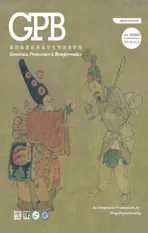Special Issue on“Artificial Intelligence in Omics”
2020-03-04
We are pleased to announce a special issue,to be published in the summer of 2022,on“Artificial Intelligence in Omics”in the journalGenomics,Proteomics & Bioinformatics(GPB).
In recent years,artificial intelligence (AI) has enabled breakthroughs across diverse biomedical fields,such as protein structure prediction,disease diagnosis,and drug discovery.AI is a powerful approach for solving complex problems in the analysis and interpretation of omics data as well as multi-omic and medical data integration.This GPB special issue aims to provide a forum for advances in the development and application of AI-based tools in omics.
Topics of the special issue include,but are not limited to:
➢ AI-based models,methods,and software for the processing,analysis,visualization,and interpretation of omics data
➢ AI-based algorithms for the integrative analysis of omics,clinical,and health data,such as medical imaging,electronic health record,social media,and epidemiological data
➢ AI-based platforms for improving disease diagnosis,precision medicine,and patient care
➢ AI-based approaches for protein structure prediction and drug discovery
➢ AI-driven rational design,such asde novoDNA or protein design
We welcome manuscripts presenting original research studies and reviews.Deadline forsubmissions to this special issue is December 31,2021.Manuscripts should be prepared according to the Guide for Authors (https://www.journals.elsevier.com/genomics-proteomics-andbioinformatics) and the manuscript template (http://gpb.big.ac.cn).Manuscripts should be submitted online at https://www.editorialmanager.com/GPB.Please select“SI:AI in Omics”when submitting your manuscript to this special issue.
Guest editors for this special issue areDr.Feng Gao(Tianjin University),Dr.Yi Xing(Children's Hospital of Philadelphia & University of Pennsylvania),andDr.Kun Huang(Indiana University School of Medicine).
For further information,please contact us at:
Dr.Feng Gao (fgao@tju.edu.cn);
Dr.Yi Xing (xingyi@email.chop.edu);
Dr.Kun Huang (kunhuang@iu.edu);
Editorial Office (editor@big.ac.cn).
